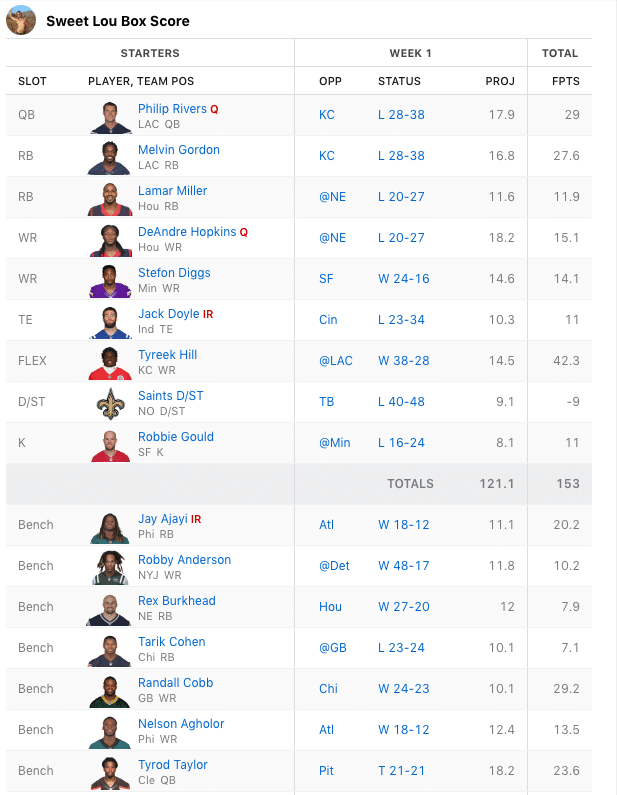Rostered in fantasy football means a player is on a team’s roster. Simple, right?
But there’s more to it. Fantasy football is a popular game where fans build virtual teams with real NFL players. Each player’s performance in real games earns points for the fantasy team. Understanding terms like “rostered” is key to success.
In fantasy football, a “rostered” player is one who is currently part of a fantasy team’s lineup. This means the player is active and can earn points for the team. Knowing which players are rostered helps managers make strategic decisions and improve their chances of winning. Let’s dive deeper into what being rostered means and why it’s important in fantasy football.

Credit: support.espn.com
Introduction To Rostered In Fantasy Football
Fantasy football uses the term “rostered” to indicate players chosen for a team’s lineup. It means the player is actively part of a fantasy team.
Fantasy football is a popular game where fans create virtual teams. These teams are made up of real NFL players. Understanding key terms is important for success. One such term is “rostered.”
Definition
“Rostered” refers to players who are currently on a fantasy team. It means they have been selected by a team owner. These players are no longer available for others to pick. This is important for managing your team.
Importance
Knowing which players are rostered helps in making strategic decisions. It tells you who is available for picking or trading. This can impact your team’s performance. Keeping track of rostered players also helps in planning for upcoming games. Understanding the concept of “rostered” can give you an edge. It simplifies team management. It keeps you aware of your team’s status. This knowledge can lead to better performance in your fantasy league. “`
How Rostering Works
Understanding how rostering works in fantasy football is crucial. It helps manage your team effectively. Rostering involves drafting players and managing your roster throughout the season. This ensures you field the best possible team each week.
Drafting Players
Drafting players is the first step in rostering. It involves selecting players for your team. This can be done through a draft event, where each team picks players in turns. Drafting strategy is important. It determines the strength of your team.
Focus on players with strong performance history. Consider their potential for the upcoming season. Balance your picks between different positions. This ensures you have a well-rounded team. Pay attention to player rankings and stats. Use them to make informed decisions.
Managing The Roster
Managing the roster is an ongoing process. It involves making weekly adjustments to your team. Monitor player performances and injuries. Replace underperforming or injured players. Add free agents or trade with other teams. This keeps your team competitive.
Set your lineup based on matchups. Some players perform better against specific opponents. Look at their upcoming games. Make adjustments accordingly. Stay updated with league news and player updates. This information helps you make better decisions.
Impact On Team Strategy
Fantasy football enthusiasts know that having a well-managed roster is crucial. Rostered means a player is on a team’s active list. It impacts team strategy significantly. Understanding how it influences player availability and injury management is key.
Player Availability
Player availability is vital in fantasy football. A rostered player is available to play. This means you can count on them for points. When a player is rostered, they are committed to your team. This commitment affects your weekly lineup decisions. You need to monitor their performance and schedule.
Teams often keep an eye on the matchups. Rostered players should ideally have favorable matchups. This increases the chances of scoring more points. You should also consider bye weeks. A player on a bye week cannot contribute to your score. Plan for these weeks in advance.
Injury Management
Injuries are part of fantasy football. Rostered players may get injured. It’s important to manage these injuries effectively. An injured player on your roster can be a liability. They take up space but do not contribute points.
You should have a strategy for dealing with injuries. This could include having backup players. Monitor injury reports closely. If a player is injured, decide whether to keep or drop them. Sometimes, keeping an injured player is a good choice. They might return later in the season.
The key is to remain flexible. Your roster should adapt to changes. This includes injuries and player performance. Always be ready to make adjustments. This will keep your team competitive.
Rostered Vs. Non-rostered Players
Understanding the difference between rostered and non-rostered players is crucial in fantasy football. Rostered players are those who are currently part of a team’s lineup. Non-rostered players, on the other hand, are free agents. These players are not on any team’s active roster. Knowing the distinction helps in making strategic decisions. It impacts your team’s performance and chances of winning.
Advantages
Rostered players provide consistent points. They are part of your team every week. You can count on their performance. This stability is valuable. It reduces the risk of unexpected losses.
Non-rostered players can be hidden gems. They might not be on anyone’s radar. Picking them up can give your team a boost. They often come with low risk and high reward potential.
Disadvantages
Rostered players can get injured. If they miss games, your team suffers. Their performance might also decline over time. This can hurt your standings.
Non-rostered players are unpredictable. They might have one good game and then disappear. This inconsistency makes them risky picks. You might waste a roster spot on them.
Roster Trends And Insights
Understanding roster trends in fantasy football can boost your game. Knowing which players are popular and how these trends change can improve your roster decisions. Let’s dive into some key insights.
Popular Picks
Popular picks are players that most fantasy managers add to their rosters. These players often have high performance potential. They are usually top performers or upcoming stars. Keeping an eye on these picks can guide your choices.
Seasonal Variations
Roster trends change with the seasons. Early in the season, managers often pick rookies or new signings. As the season progresses, focus shifts to consistent performers. End-of-season trends often involve picking playoff-bound players. Understanding these patterns can help you stay ahead.
Tools For Managing Rosters
Managing rosters in fantasy football can be challenging. The right tools make the process smoother. These tools help you track player performance, make strategic decisions, and stay competitive. Whether you use built-in features or third-party apps, you can find the best fit for your needs.
Fantasy Platforms
Most fantasy football platforms offer roster management tools. These tools include player stats, injury reports, and matchup analysis. Platforms like ESPN, Yahoo, and NFL offer these features. They help you manage your team effectively. You can easily add or drop players and set your lineup.
Third-party Applications
Third-party apps provide additional roster management features. Apps like FantasyPros and RotoWire offer advanced statistics and projections. They can sync with your fantasy platform. This makes it easier to get the latest updates. You can also use these apps for waiver wire advice and trade suggestions. These tools can give you a competitive edge.
Tips For Effective Rostering
Knowing how to roster effectively in fantasy football can set you apart. It means strategically selecting and managing players on your team. Effective rostering can make a big difference in your league performance. Below are some tips to help you master this crucial aspect.
Research
Research is key in fantasy football. Stay updated with player stats and injury reports. Check out expert analyses and player rankings. This information helps you make informed decisions. Know the strengths and weaknesses of your players. Always look for trends and patterns. They can help you predict future performances.
Flexibility
Flexibility is crucial in fantasy football. Keep your roster adaptable. Be ready to make changes when needed. Don’t stick to underperforming players for too long. Swap players based on matchups and player form. Balance your roster with both star players and reliable backups. Flexibility can give you an edge over your competitors.

Credit: www.youtube.com
Common Mistakes To Avoid
Fantasy football can be fun and exciting. But, many make common mistakes that can hurt their team’s performance. Knowing what to avoid can give you an edge over your competition.
Overvaluing Players
One common mistake is overvaluing players based on their past performances or popularity. While it is important to have star players, putting too much faith in one or two can be risky. Here are some tips to avoid this:
- Look at recent stats, not just past achievements.
- Consider the player’s current team and their schedule.
- Balance your roster with reliable, consistent performers.
A balanced team often outperforms a team with one or two stars. Spread your risk and build a strong, reliable roster.
Neglecting Bench Strength
Another mistake is neglecting bench strength. Many focus on their starting lineup and ignore their bench. This can be a big mistake. Your bench players are crucial during bye weeks and injuries. To build a strong bench:
- Draft versatile players who can fill multiple positions.
- Keep an eye on emerging talents and waiver wire pickups.
- Don’t overlook players with high potential, even if they are not starters.
A strong bench can make the difference between a winning season and a frustrating one. Ensure you have depth and options.
By avoiding these common mistakes, your fantasy football team can be more competitive and resilient. Focus on building a balanced roster and a strong bench, and you’ll be better prepared for the season ahead.
Frequently Asked Questions
What Does Rostered Mean In Fantasy Football?
In fantasy football, rostered means a player is part of a team’s lineup. It means the player is chosen and active for games.
How Is Rostered Different From Benched?
Rostered players are active and can earn points. Benched players are inactive and do not contribute to the score.
Why Is Rostering Important In Fantasy Football?
Rostering is important because it determines which players earn points. It helps in strategizing and maximizing a team’s performance.
How Do You Roster A Player?
To roster a player, you select them from your fantasy team’s pool. They become part of your active lineup.
Conclusion
Understanding “rostered” in fantasy football is essential for success. It helps manage your team better. Now, you know how players are added to rosters. This knowledge can improve your game strategy. Keep these tips in mind during your season. Make smarter decisions and enjoy the game more.





